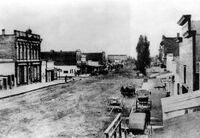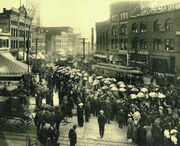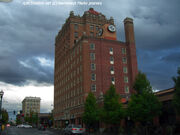
Downtown Walla Walla. AJM STUDIOS Northwest Photo Journey.
Walla Walla is the largest city in and the county seat of Walla Walla County, Washington.
The population was 29,686 at the 2000 census and 31,350 from the 2008 estimate of the Washington State Office of Financial Management. Walla Walla is in the southeastern region of Washington, approximately four hours by car from Seattle, and thirteen miles from the Oregon border, where the town of Milton-Freewater is.
Whitman College, Walla Walla Community College, and the Washington State Penitentiary are located in Walla Walla. Walla Walla University is located in nearby College Place, Washington. In addition, Baker Boyer Bank, the oldest bank in the state of Washington, was founded in Walla Walla in 1869.
Walla Walla is famous for its sweet onions. Many wineries are located in the area and it is a popular vacation spot for wine enthusiasts.
History[]

Downtown Walla Walla in 1877.
On September 1, 1836, Marcus Whitman arrived with his wife Narcissa Whitman. Here they established the Whitman Mission to try and convert the local Walla Walla tribe to Christianity. Following a disease epidemic, both were killed by the Cayuse who believed that the missionaries were poisoning the native peoples. Whitman College was established in their honor.

Parade in Walla Walla, 1892.
The original Northwest Company and later Hudson's Bay Company Fort Nez Percés fur trading outpost, became a major stopping point for migrants moving west to Oregon Country. The fort has been restored with many of the original buildings preserved . The current Fort Walla Walla contains these buildings, albeit in a different location from the original, as well as a museum about the early settlers' lives.

Downtown Walla Walla in 1909.
The Walla Walla River, where it adjoins the Columbia River, was the starting point for the Mullan Road, constructed between 1859 and 1860 by US Army Lieut. John Mullan, connecting the head of navigation on the Columbia at Walla Walla (i.e., the west coast of the US) with the head of navigation on the Missouri-Mississippi (that is, the east and gulf coasts of the US) at Fort Benton, Montana.
Walla Walla was officially incorporated on January 11, 1862. As a result of a gold rush, during this decade the city became the largest community in the territory of Washington, at one point slated to be the new state's capital. The former Governor's mansion still stands in the southern part of the city. Following this period of rapid growth, agriculture became the city's primary industry.
Climate[]
Walla Walla, WA climate is warm during summer when temperatures tend to be in the 70's and very cold during winter when temperatures tend to be in the 30's.
The warmest month of the year is July with an average maximum temperature of 89.90 degrees Fahrenheit, while the coldest month of the year is January with an average minimum temperature of 28.80 degrees Fahrenheit.
Temperature variations between night and day tend to be moderate during summer with a difference that can reach 29 degrees Fahrenheit, and fairly limited during winter with an average difference of 13 degrees Fahrenheit.
The annual average precipitation at Walla Walla is 19.71 Inches. Rainfall in is fairly evenly distributed throughout the year. The wettest month of the year is November with an average rainfall of 2.62 Inches.
Geography[]
According to the United States Census Bureau, the city has a total area of 28.0 km sq (10.8 square miles). 28.0 km sq (10.8 mi sq) of it is land and 0.1 km sq (0.04 mi sq) of it (0.18%) is water.
Culture[]

Historic downtown Walla Walla. AJM STUDIOS Northwest Photo Journey.
Though wheat is still a big crop, vineyards and wineries have become economically important over the last two decades. In summer 2006, there were over 100 wineries in the greater Walla Walla area. Following the wine boom, the town has developed several top-tier restaurants and hotels. The Marcus Whitman hotel, one of Washington's finest early 1900s hotels, was recently renovated with its original fixtures and furnitures. It is the tallest building in the city, reaching thirteen stories.
The Walla Walla Sweet Onion is another crop with a rich tradition. Over a century ago on the Island of Corsica, off the west coast of Italy, a French soldier named Peter Pieri found an Italian sweet onion seed and brought it to the Walla Walla Valley. Impressed by the new onion's winter hardiness, Pieri, and the Italian immigrant farmers who comprised much of Walla Walla's gardening industry, harvested the seed. The sweet onion developed over several generations through the process of carefully hand selecting onions from each year's crop, ensuring exceptional sweetness, jumbo size and round shape. The Walla Walla Sweet Onion is also designated under federal law as a protected agricultural crop. In 2007, the Walla Walla Sweet Onion became Washington's official state vegetable.
Walla Walla Sweet Onions get their sweetness from low sulfur content, which is half that of an ordinary yellow onion. Walla Walla Sweets are 90 percent water. That, combined with Walla Walla’s mild climate and rich soil, gives the onion its sweetness. The Walla Walla Sweet Onion Festival is held annually in July.
From asparagus and corn to cherries and strawberries, Walla Walla growers produce produce that is available to visitors at the farmers' market from May until October; located on the corner of 4th and Main. A selection of bakery treats, flowers and plants, creative arts, and craft items are also on sale at the farmers' market open 9:00am to 1:00pm both Saturday and Sunday.
Walla Walla has experienced an explosion in its wine industry over the last ten years. Producing some of the finest American wines, Walla Walla is quickly becoming a destination for wine connoisseurs the world over. Several of the wineries have received top scores from wine publications such as Wine Spectator, The Wine Advocate and Wine and Spirits. L'Ecole 41, Woodward Canyon and Leonetti Cellar were the pioneers starting in the 1970s and 1980s. They have been joined by many noteworthy producers like Walla Walla Village Winery, Cayuse Vineyards, Spring Valley Vineyards, Waterbrook Winery, Reininger Winery, Forgeron Cellars, Tamarack Cellars, Seven Hills Winery, Pepper Bridge Winery, Amavi Cellars, and Walla Walla Vintners as well as dozens of smaller wineries. Although most of the early recognition went to the wines made from Merlot and Cabernet, Syrah is fast becoming a star varietal in this appellation. Today there are over 100 wineries in the Walla Walla Valley and a host of shops catering to the wine industry.
Walla Walla Community College capitalizes on the opportunity to market the wine industry. The school offers an associate's degree in winemaking through its 4-year-old Institute of Enology and Viticulture, which operates its own commercial winery. One challenge to growing grapes in Walla Walla Valley is the risk of a killing freeze during the winter. They average one every six or seven years and the last one, in 2004, destroyed about 75% of the wine grape crop in the valley.
Landmarks[]

Marcus-Whitman Hotel is a landmark in downtown Walla Walla. AJM STUDIOS Northwest Photo Journey.
Whitman College, the Whitman Mission, and the Marcus Whitman Hotel are just a few landmarks in this very historic city. Downtown is a historic district, and numerous colleges and churches are around the city with historic importance, as well as residential neighborhoods.
Media[]
Television
KORX-CA
KWWO-LP
Newspapers
Pioneer
Valley News
Walla Walla Union-Bulletin (Main Newspaper)
Sports[]
Baseball: WCL: Walla Walla Sweets
Infrastructure[]
Health systems[]
Walla Walla has two major hospitals. There is Saint Mary Medical Center and Walla Walla General Hospital. The next closest hospital is in either Dayton, Washington or Pendleton, Oregon.
Crime[]
Wenatchee is serviced by the Walla Walla Police Department and the Walla Walla County Sheriff's Department.
Transportation[]
Transportation to Walla Walla includes service by air through Walla Walla Regional Airport and highway access primarily from U.S. Route 12. Washington State Department of Transportation is now engaged in a long-term process of widening this road into a four-lane divided highway between Pasco, Washington and Walla Walla. The city is also served by Valley Transitand the Grape Line service to Pasco.
